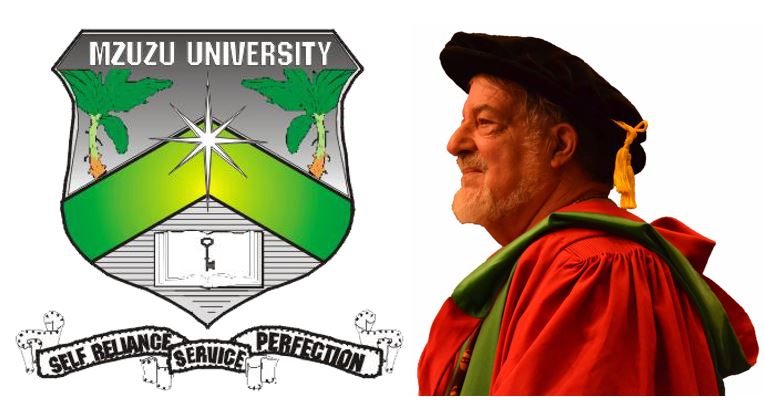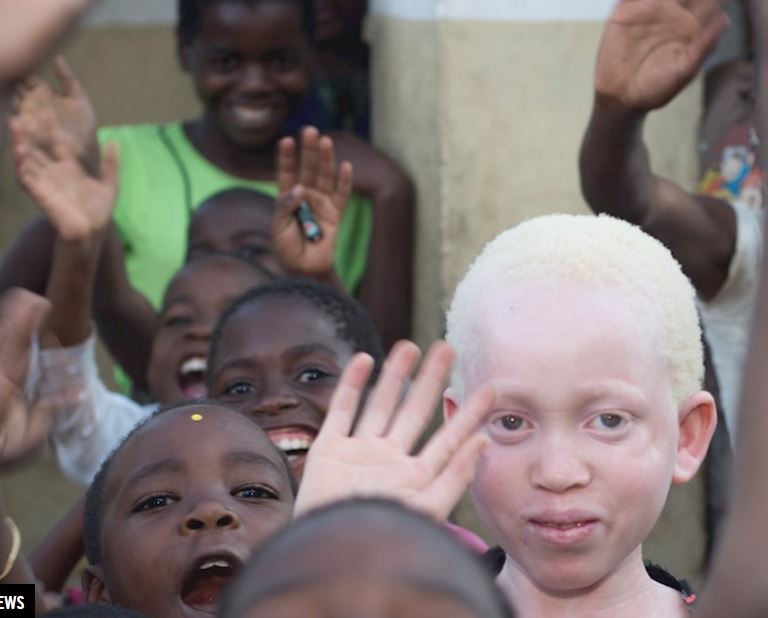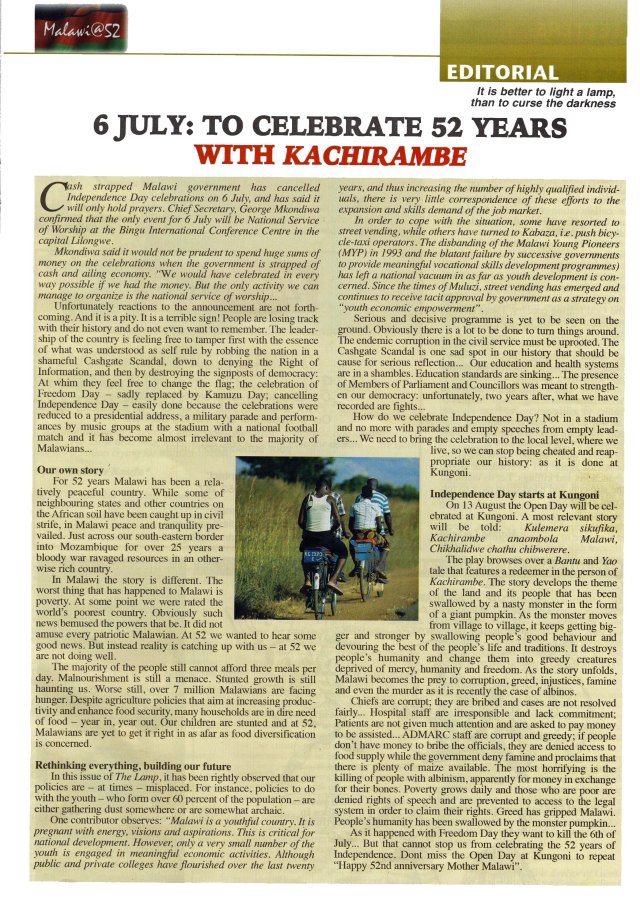June 21, 2016. On 20th May MultiChoice Malawi brought journalists from across Malawi to Kungoni Centre to celebrate Africa Day.
 Also in the Nation on 24th May: Thoughts from a retreat. By Yvonnie Sundu, May 24, 2016.
Also in the Nation on 24th May: Thoughts from a retreat. By Yvonnie Sundu, May 24, 2016.
Claude Boucher Chisale, Visual Artist
 By Sam Banda Jnr
By Sam Banda Jnr
It is on a Friday, MultiChoice Malawi has organised yet another annual trip for journalists to celebrate Africa Day which falls on May 25 every year. This is the annual commemoration on May 25, 1963 of the founding of the Organisation of African Unity (OAU). On this day, leaders of 30 of the 32 independent African states a founding charter in Addis Ababa, Ethiopia.
However, the trip has been organised much earlier on May 20 to give a chance to journalists to sensitise people about Africa Day. Just as MultiChoice has done every year, they have not told the journalists where they are taking them to having departed early in the morning in Blantyre. It turns out to be a long trip which takes us close to three hours and finally we arrive at Mua in Dedza. Such a quiet place and one would be compelled to think it a dull area.
Welcome to Mua Mission which also houses Kungoni Arts Centre of Culture and Art. The road to the place is not tarmac. But wait a minute, we are journalists from Blantyre and so as we arrived, we met fellow journalists from Lilongwe, what an exciting outing this is going to be.
We greet each other before being taken through the programme. What a trip, we are going to meet artist Claude Boucher Chisale, who founded Kungoni Centre in 1976.
There is a lot to learn here and Chisale tells us that there is so much but since this was a day’s trip, they would try as much to tell us more on the history of Kungoni which is built on the grounds of Mua Mission. Chisale speaks Chichewa fluently having come to Malawi in 1967 from Canada. He loves Africa and loves Malawi which is now his home and he is proud of it. When he was speaking, we all stayed quiet as he moved us with his story and that of Kungoni, telling us the beauty of Malawi and the beauty of preserving “our culture.”
And while many of us prefer going for holidays outside the country, there is a lot we are missing out and I would recommend many of you to take time out and visit Mua. It is a place that offers visitors a unique insight upon the cultural and artistic inheritance of Malawi and preserves for Malawians a treasure house of what is distinctive in the cultures of the Chewa, Ngoni and Yao people, who converge in the Mua area.
Back to A Chisale as he is fondly called, a lot has been said about him but for those of you who do not know his story, he was born in Canada in 1941. He followed in the steps of his maternal aunt to come to Malawi as a priest of the Missionaries of Africa (the White Fathers) in 1967.
Apart from brief periods of study in Uganda and London, he has remained in Malawi ever since.
“I love Malawi, this is my home. I am proud to be here,” said Chisale, when asked whether he does not have ambitions of going back to Canada. Chisale’s life work has been at Mua Mission, where he founded Kungoni.
According to him, the centre started as a cooperative for wood carvers and that over the years, it has grown to encompass the Chamare Museum (which holds important ethnographic collections on the Chewa, Yao and Ngoni peoples of Malawi). The centre also [comprises] the Kafufuku research library, Namalikhate lodge and Ku Mbewu (a women’s cooperative).
He said Kungoni has decorated churches throughout Malawi and elsewhere, as far afield as Kenya and Germany; and that example of its work, both religious and secular, are to be found in collections which include the Vatican Museums.
The priest, artist and anthropologist, took the name Chisale when he became one of the few non-Chewa to be initiated into Nyau, the secret society which is responsible for Gule Wamkulu.
He has sought over the 40 years of his work at Mua Mission to create dialogue and understanding where before there was hostility and suspicion. As a result, he has been granted unparalleled access to Chewa traditional access to Chewa traditional custom; and Chewa participants in Gule Wamkulu no longer feel themselves excluded from the life of the church.
“Religion and culture go together and this is why when I came I made sure I associated with the people who were deep rooted into culture. First you must understand that as people we have culture and then with it there is also religion,” he said with a little smile.
He has written several books and one of his extensive accounts of his life and work is his book When Animals Sing and Spirits Dance. This year Kungoni Arts is celebrating its 41st anniversary while Chisale is celebrating his 75th birthday.
“This country was given to us by our parents and so let’s preserve it, let’s treasure our culture and extract from it important elements which will help develop our country,” he said.
Chisale observes that many Malawians do not value their culture and that other wishes they were not born here. ‘We can do better, we have to thank God that we were born in Malawi and Africa. Africa is not poor and Malawi is not poor as others always put it. This is a rich nation with so much to treasure,” he said.
In his book When Animals Sing and Spirits Dance, Chisale tells us more about his 40 years encounter with Gule Wamkulu, the Great dance of the Chewa people of Malawi. Gule Wamkulu is an extraordinarily rich tradition, which United Nations Educational, Scientific and Cultural Organisation (UNESCO) recognised as constituting part of the Oral and Intangible Heritage of Humanity in 2005.
Chisale said he understands it as the vehicle by which the ancestors return to the village to offer social commentary and advice to the living. Gule Wamkulu has a vast plethora of characters, both masked and concealed with structures, which we appreciated in the museum. He said Gule Wamkulu is an indispensable part of initiation and funeral rites and of ceremonies to commemorate the dead and that nowadays it is performed during cultural events and political gatherings.
Through the Kungoni Dance Troupe, journalists appreciated traditional dances from the Ngoni and Chewa which were held at a place known as Matako Apekesana. Throughout all the traditional dances which included Ngoma from the Ngoni and Gule Wamkulu, Chisale explained in detail why these traditional dances were performed as well as the different regalia’s worn.
“I am happy that MultiChoice thought of bringing journalists here as we look ahead to celebrating Africa Day. We have so much to share here and apart from that we also teach cultural courses and even art,” he said.
This was surely a good encounter with A Chisale, a man who has always valued culture and so why can’t we do the same?
 Great Works Attract Great Admiration and Recognition.
Great Works Attract Great Admiration and Recognition. History repeated itself this year when on the 24th of March 2017, Fr. Claude Boucher, M.Afr, received his 2nd Honorary Doctorate Degree in the same discipline by the University of Mzuzu at Bingu International Convention Centre in Lilongwe, Malawi. The 18th Congregation (graduation ceremony) of the Mzuzu University that lasted for four hours drew thousands of people from various part of the country. 851 graduated with Diplomas, first Degrees, Masters and P. HD in different fields.
History repeated itself this year when on the 24th of March 2017, Fr. Claude Boucher, M.Afr, received his 2nd Honorary Doctorate Degree in the same discipline by the University of Mzuzu at Bingu International Convention Centre in Lilongwe, Malawi. The 18th Congregation (graduation ceremony) of the Mzuzu University that lasted for four hours drew thousands of people from various part of the country. 851 graduated with Diplomas, first Degrees, Masters and P. HD in different fields. The ceremony was climaxed by interviews on different topics patterning to culture with the new Doctor of Culture and Anthropology. Fr. Claude recurred and narrated to his confrere who represented the White Fathers at the function when many years back he was requested by his Superiors to pursue further a Doctorate Degree in Culture and Social Anthropology after obtaining his M.A. and his reply was, he shall do the Doctorate in the field. This is a dream come true, with two Doctorates in the field. Big congrats Dr. Dr. or Dr² Claude!
The ceremony was climaxed by interviews on different topics patterning to culture with the new Doctor of Culture and Anthropology. Fr. Claude recurred and narrated to his confrere who represented the White Fathers at the function when many years back he was requested by his Superiors to pursue further a Doctorate Degree in Culture and Social Anthropology after obtaining his M.A. and his reply was, he shall do the Doctorate in the field. This is a dream come true, with two Doctorates in the field. Big congrats Dr. Dr. or Dr² Claude!









 By Sam Banda Jnr
By Sam Banda Jnr